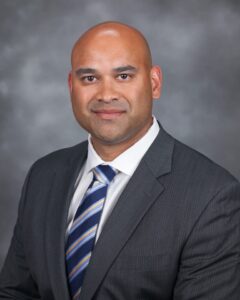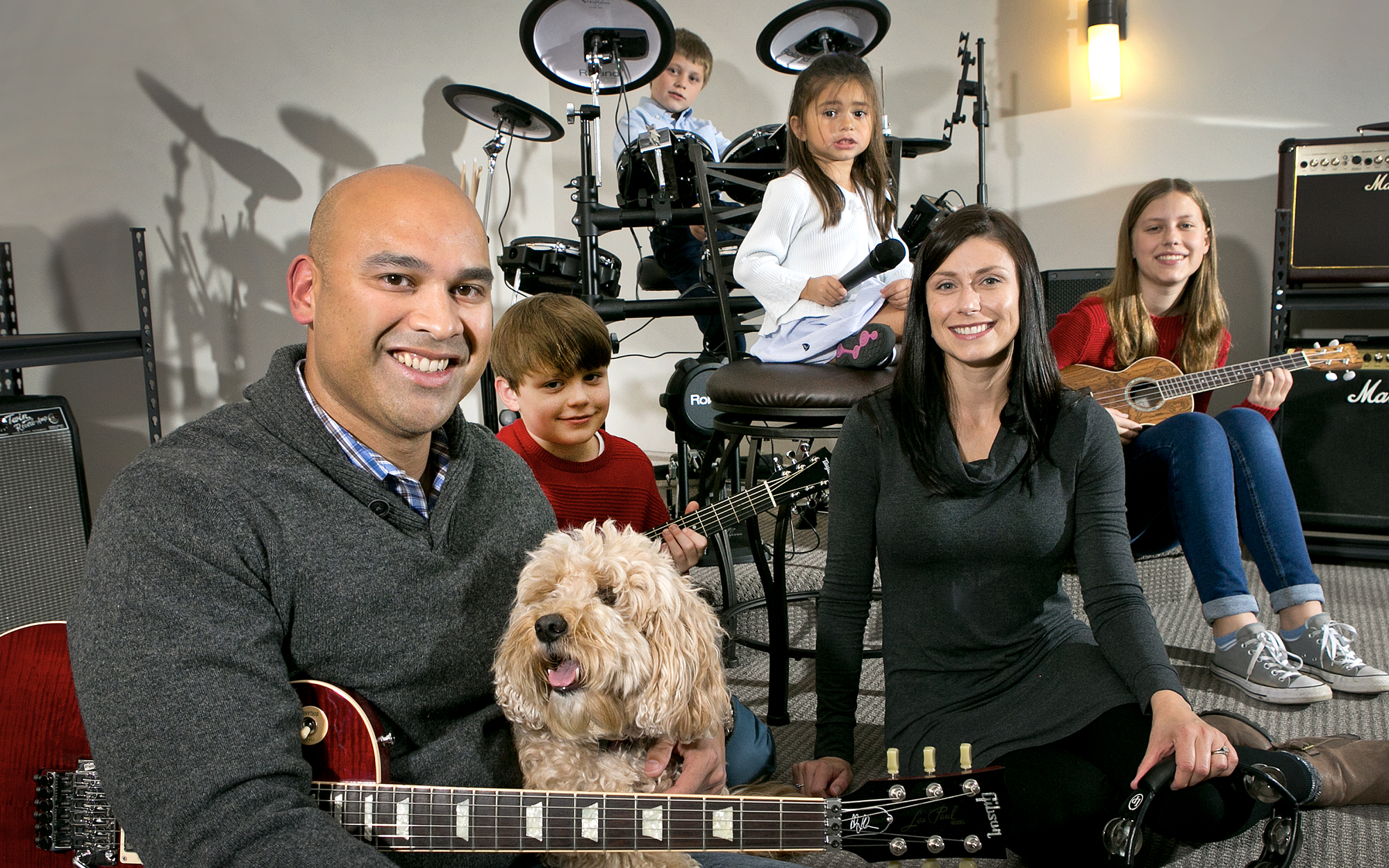ORA Orthopedic’s Dr. Sanjay Sundar and his musical family take center stage in this month’s “What Moves Me” feature story.
Meet ORA’s New Pain Management physician, Dr. Sanjay Sundar. Dr. Sundar specializes in treating chronic neck and back pain and performs procedures designed to alleviate orthopedic-related pain.
Meet ORA Orthopedics Pain Management Specialist: Dr. Sanjay Sundar
Name:

Dr. Sanjay Sundar, ORA Orthopedics
Hometown:
Chicago, IL
Specialty:
Pain Management
Tell us about your life journey from growing up in Chicago, to studying medicine, and locating here along the Mississippi River!
I grew up in the suburbs of Chicago. My parents were first generation immigrants, both physicians. I spent eight years in Washington D.C. for my education and returned Chicago for training. Finally, I took a position in Moline in 2011. Kind of a roundabout way to get here, but very glad that I did.
We understand you love music and everyone in your family plays an instrument!

Music plays an integral role in life around the Sundar home – each member knows how to play at least one instrument.
My wife and I try our best to encourage our children to at least learn how to play one instrument, if not several. They’re all at different stages, but are most importantly having fun with it.
What is your favorite kind of music?
I love all kinds of music, but find myself listening and performing mostly acoustic songs. Our family loves playing music together. It’s a great way for us to spend time together and have fun while learning a lifelong pastime.
What do you like best about the QC cultural scene?
Moving to the quad cities was certainly a change of pace for me, but over time I’ve found a great music and cultural scene. Every year it seems like there’s more to do. We especially love the new restaurants around town and concerts at The River Music Experience.
What inspired you to pursue a career in medicine and specifically pain management?
Initially, I dabbled with the idea of being a writer, but quickly realized I wasn’t good enough for anyone to want to read my work! Being from a medical family, I had a lot of exposure to the field as a kid.
What struck me was the amazing amount of satisfaction my parents had in their careers and how grateful they were to be able to help others. That initially got me into medicine and eventually into pain management. I still think that being a physician is one of the greatest jobs in the world and a terrific blessing.
What types of pain management or conditions do you treat or specialize in?
In my practice, I try as much as possible to stay generalized. You never know what kind of patient is going to walk through the door. That being said, I enjoy helping patients with more challenging conditions that involve neuropathic or nerve pain.
Patients often live with pain until it becomes unbearable. What’s your advice?
From all the evidence that we have, it is important to treat pain early on in the course. I would advise patients to think about seeing a physician if their pain is very severe or lasting longer than it should, typically 6-8 weeks. Treating chronic pain conditions gets harder as time goes on as there are a number of physiologic changes that take place.
Tell us about new treatments for pain that people may not be aware of: Should these be considered before, after or instead of surgery?
Other than steroid injections, our clinic offers various types of nerve ablation therapy, as well as spinal cord stimulation. At the current time, we are learning a lot about peripheral nerve stimulation and regenerative therapy.
Pain management is a continually expanding field, but a very young one. It’s an exciting time to be a pain physician.
What do you enjoy most about your career, and what inspires you most about your patients?
I truly enjoy talking to my patients and learning a little bit about their families and interests. At the heart of any good doctor is an individual who is genuinely interested in others. Seeing patients get back to their normal lives and not have to spend time in my office is very rewarding.
What piece of advice do you wish your patients would take to heart?
I would encourage my patients to keep in mind that the majority of our current state of health is simply an accumulation of good and bad choices over the course of a lifetime.
I can’t stress enough the importance of regular exercise and a reasonable diet. These are the very simple things that we can all do on a daily basis to improve our chances of living a happy pain free life.
Meet ORA Orthopedics Pain Management Specialist: Dr. Sanjay Sundar
Name:

Dr. Sanjay Sundar, ORA Orthopedics
Sanjay Sundar
Hometown:
Chicago, IL
Specialty:
Pain Management
Tell us about your life journey from growing up in Chicago, to studying medicine, and locating here along the Mississippi River!
I grew up in the suburbs of Chicago. My parents were first generation immigrants, both physicians. I spent eight years in Washington D.C. for my education and returned Chicago for training. Finally, I took a position in Moline in 2011. Kind of a roundabout way to get here, but very glad that I did.
We understand you love music and everyone in your family plays an instrument!

Music plays an integral role in life around the Sundar home – each member knows how to play at least one instrument.
One of my great loves is music. I find that it can make most any day, a better one. My mom “made” me learn saxophone, clarinet, violin, and guitar as a child. I actually stopped playing music completely when I was 10 and picked it back up on my own later in high school. Even though I took a hiatus from music, I have my mom to thank for my ongoing interest.
My wife and I try our best to encourage our children to at least learn how to play one instrument, if not several. They’re all at different stages, but are most importantly having fun with it.
What is your favorite kind of music?
I love all kinds of music, but find myself listening and performing mostly acoustic songs. Our family loves playing music together. It’s a great way for us to spend time together and have fun while learning a lifelong pastime.
What do you like best about the QC cultural scene?
Moving to the quad cities was certainly a change of pace for me, but over time I’ve found a great music and cultural scene. Every year it seems like there’s more to do. We especially love the new restaurants around town and concerts at The River Music Experience.
What inspired you to pursue a career in medicine and specifically pain management?
Initially, I dabbled with the idea of being a writer, but quickly realized I wasn’t good enough for anyone to want to read my work! Being from a medical family, I had a lot of exposure to the field as a kid.
What struck me was the amazing amount of satisfaction my parents had in their careers and how grateful they were to be able to help others. That initially got me into medicine and eventually into pain management. I still think that being a physician is one of the greatest jobs in the world and a terrific blessing.
What types of pain management or conditions do you treat or specialize in?
In my practice, I try as much as possible to stay generalized. You never know what kind of patient is going to walk through the door. That being said, I enjoy helping patients with more challenging conditions that involve neuropathic or nerve pain.
Patients often live with pain until it becomes unbearable. What’s your advice?
From all the evidence that we have, it is important to treat pain early on in the course. I would advise patients to think about seeing a physician if their pain is very severe or lasting longer than it should, typically 6-8 weeks. Treating chronic pain conditions gets harder as time goes on as there are a number of physiologic changes that take place.
Tell us about new treatments for pain that people may not be aware of: Should these be considered before, after or instead of surgery?
Other than steroid injections, our clinic offers various types of nerve ablation therapy, as well as spinal cord stimulation. At the current time, we are learning a lot about peripheral nerve stimulation and regenerative therapy.
Pain management is a continually expanding field, but a very young one. It’s an exciting time to be a pain physician.
What do you enjoy most about your career, and what inspires you most about your patients?
I truly enjoy talking to my patients and learning a little bit about their families and interests. At the heart of any good doctor is an individual who is genuinely interested in others. Seeing patients get back to their normal lives and not have to spend time in my office is very rewarding.
What piece of advice do you wish your patients would take to heart?
I would encourage my patients to keep in mind that the majority of our current state of health is simply an accumulation of good and bad choices over the course of a lifetime.
I can’t stress enough the importance of regular exercise and a reasonable diet. These are the very simple things that we can all do on a daily basis to improve our chances of living a happy pain free life.







Recent Comments